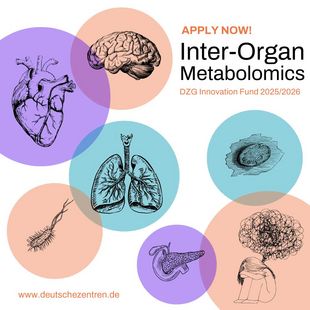The aim of the DZGIF is to strengthen networking between its members, facilitate joint research and thus create interdisciplinary synergies between the DZGs. The centers pool their expertise in order to facilitate and fund promising, cross-disease research ideas that advance knowledge on the prevention and treatment of common diseases.
Revealing disturbed communication between organs
The current call for proposals "Inter-Organ Metabolomics" states: "Maintaining systemic homeostasis and responding to nutritional and environmental challenges requires the coordination of multiple organs and tissues. To respond to diverse metabolic demands, higher organisms have evolved a system of inter-organ communication through which one tissue can influence metabolic pathways in a distant tissue.
Dysregulation of these communication pathways contributes to human diseases such as obesity, diabetes, lung disease, cancer, infection, liver disease, neurodegenerative diseases, mental disorders and atherosclerosis. In recent years, technical advances such as data-driven bioinformatics, metabolomics, proteomics, and lipidomics have helped to understand the complexity of systemic metabolic cross-talk and its underlying mechanisms. This multidisciplinary approach has provided unprecedented insights into the interconnectedness of metabolic pathways and highlighted the dynamic communication and coordination required to maintain homeostasis throughout the body.
Looking to the future, this call for proposals aims to promote research between the DZGs in the following areas:
(i) exploring the influence of external factors on inter-organ communication,
(ii) developing a more detailed picture of metabolic heterogeneity within organs,
(iii) investigating dynamic changes in metabolite fluxes and metabolic pathways under different physiological and pathological conditions, to gain a more functional and context-specific understanding of inter-organ metabolism, (iv) developing integrative approaches to decipher the intricate molecular networks that control metabolism, and (v) facilitating the identification of biomarkers, drug targets, and the development of more effective therapeutic strategies for metabolic diseases."

